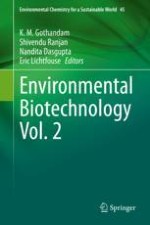2020 | OriginalPaper | Chapter
2. Biorefinery: A Concept for Co-producing Biofuel with Value-Added Products
Authors : Senthil Nagappan, Ekambaram Nakkeeran
Published in: Environmental Biotechnology Vol. 2
Publisher: Springer International Publishing
Activate our intelligent search to find suitable subject content or patents.
Select sections of text to find matching patents with Artificial Intelligence. powered by
Select sections of text to find additional relevant content using AI-assisted search. powered by
